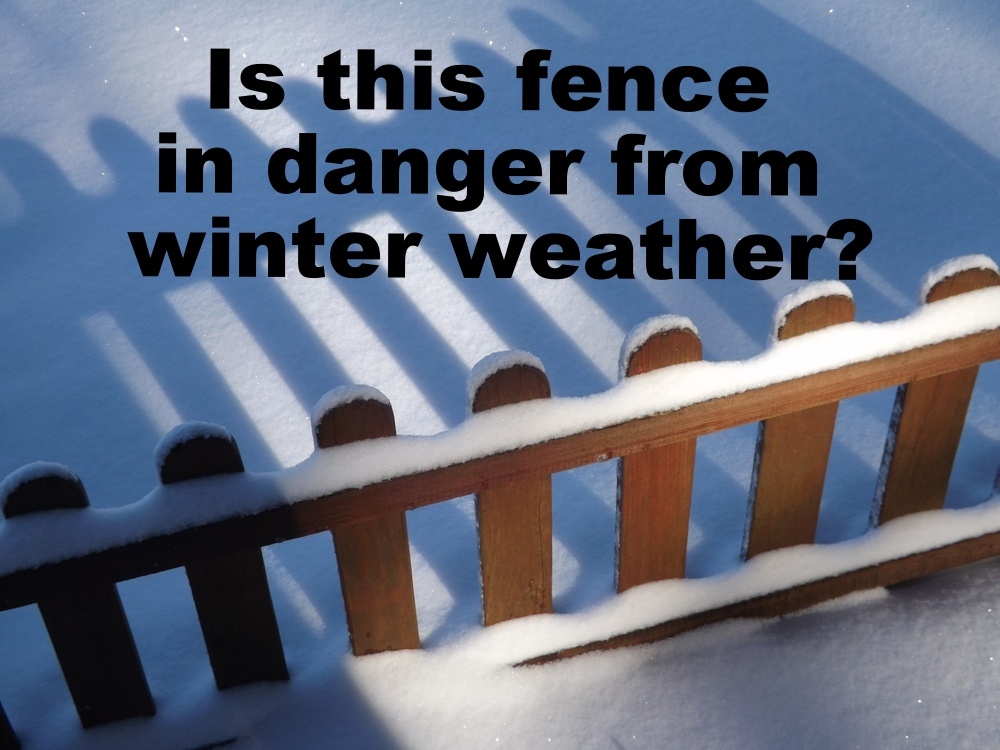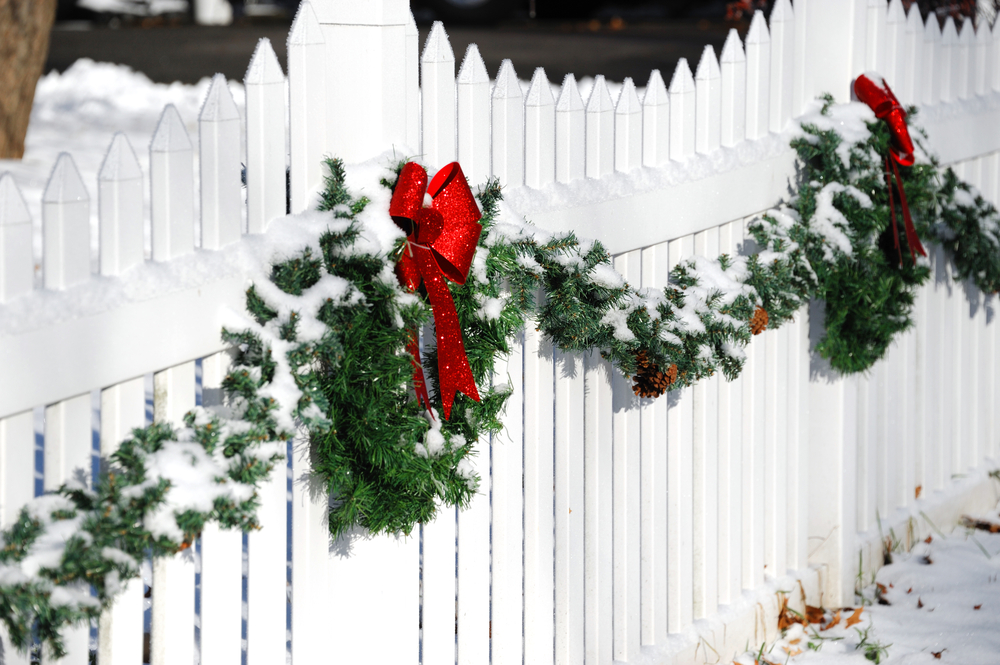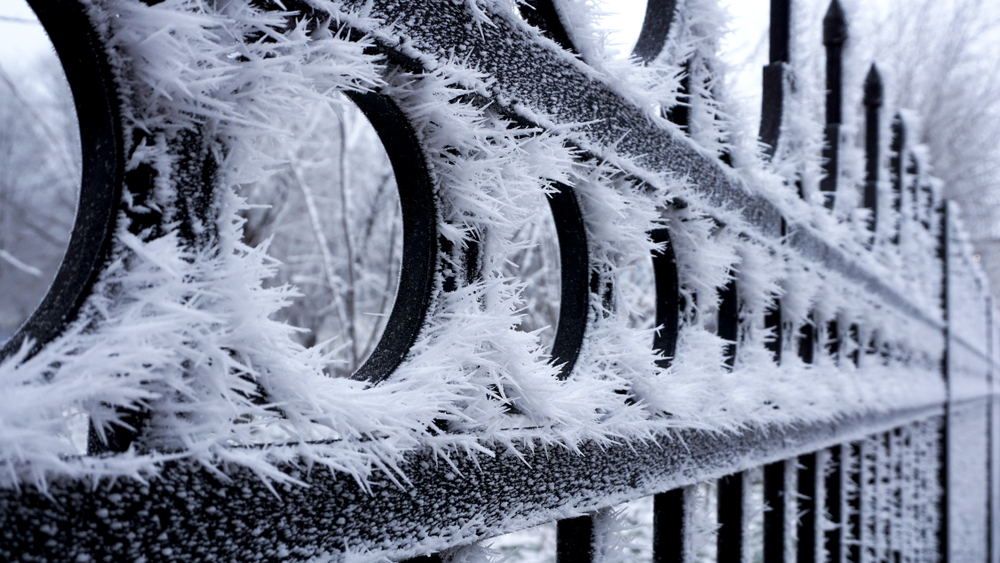How Can Winter Weather Affect Your Fence?
Living in the Mid-Atlantic, harsh winter conditions are a fact of life. The same things you don’t like about winter, especially the snow and cold, can also affect your fence. The winter preparation and care needed to preserve your fence for years to come will depend on the type of fence you own and the winter conditions that will affect your yard.
Wood fences require some maintenance prior to winter weather to make them last and look their best. A vinyl or aluminum fence will be fine without any preparation, which is one of the top benefits of those fence materials. No matter the type of fence you own, you should do some minor yard maintenance before and during winter, since things like snow and leaves can damage your fence. For more on seasonal fence maintenance, check out our advice on how to maintain your wood fence year round.

If you are preparing your wood fence for winter…
Winter creates a lot of moisture issues, which can be bad for your wood fence. Mold, mildew, and even rot can be the result of a harsh winter or can be created over time if your fence is not prepared for winter weather year after year. Choosing the right type of wood can help prevent moisture issues, but wood fences still need some annual care. Falling limbs and debris from nearby trees can also damage your fence over the winter.
What you can do to maintain your wood fence:
- Make sure your fence is in good condition before snow falls.
- Check for softwood, indicating rot, or tunnels with sawdust that are a sure sign of invasive wood-destroying insects.
- Use wood putty to patch small holes or cracks, and replace any boards that are damaged beyond repair.
- Gently clean snow and ice buildup off your fence with a broom
Since wood absorbs moisture, it’s also a great idea to check for water resistance by performing the “splash test.” Sprinkle a few drops of water on your wood fence and see if the water beads or if it absorbs into your fence pickets, posts, or panels. If it does absorb, it’s a sign that your fence is not waterproof and needs to be treated with a waterproof stain or a clear sealer.
If you are preparing your vinyl fence for winter…

Vinyl fences are low maintenance, but they should still be kept snow-free during the winter.
One major benefit of vinyl is that it doesn’t need to be sealed or painted, but this doesn’t mean there’s no winter work to be done in your fence area. The big risk to your vinyl fence in winter is damage from ice and snow. While some festive decorations are fine, the weight of snow can cause sagging, warping, and even cracking in your vinyl fence.
What you can do maintain your vinyl fence:
- Keep snow away from your vinyl fence.
- Shovel snow towards the middle of your yard so it doesn’t drift and pile up along your fence panels.
- Gently brush off large amounts of snow off your fence and any decorations, being careful not to hit or scratch the fence itself.
- Use a broom instead of a snow shovel if possible to clean snow off your fence
If you have a fence lining your driveway, parking area, or sidewalk, you will need to avoid shoveling or blowing snow against your fence. If you hire a plow service, make sure they know not to pile snow against your fence, especially if they concentrate the snow in one area. You may also consider installing temporary plow markers away from your fence line so plows or snow blowers don’t come too close to your fence, damaging it either from the snow or the equipment itself.
Generally as long as you keep ice and snow from piling up, your vinyl fence should little maintenance.
If you are preparing your aluminum fence for winter…

Make sure to pile snow away from your fence to avoid shifting posts or moisture problems.
Like vinyl fences, aluminum fences don’t have problems with rot or insect damage and are also fairly low maintenance. That doesn’t mean that aluminum fences don’t suffer under winter weather conditions. While some aluminum fences can be damaged by the weight of snow, shifting soil or gravel is a winter concern that can displace your fence and make it less stable and secure. The constant thawing and refreezing of winter precipitation causes the soil to expand and contract, which may compromise your fence posts.
What you can do to maintain your aluminum fence:
- Remove autumn leaves, snow, or ice dams to keep them in tip-top shape for the life of your fence.
- Make sure you use a reputable fence installer who will create proper cement footings for your fence post.
- Do not install footings when it’s very far below freezing since the cement will not set properly.
- Check the area around the footings throughout the winter.
- Keep trees and shrubs trimmed so your aluminum fence isn’t damaged or compromised by falling debris, such as tree limbs.
A bit of forethought in the fall and some routine maintenance during the winter can make sure your fence stays fresh and dry for years to come. Maintaining a wood fence takes a bit more effort than a maintenance-free vinyl or aluminum fence that just takes some forethought when working on your driveway, sidewalk and yard over the winter months.
To order fence parts or schedule professional installation,
call 800-431-4303 or contact us online!


1 Comment
Could snow blow out vinyl fencing that is back to back
1 Trackback